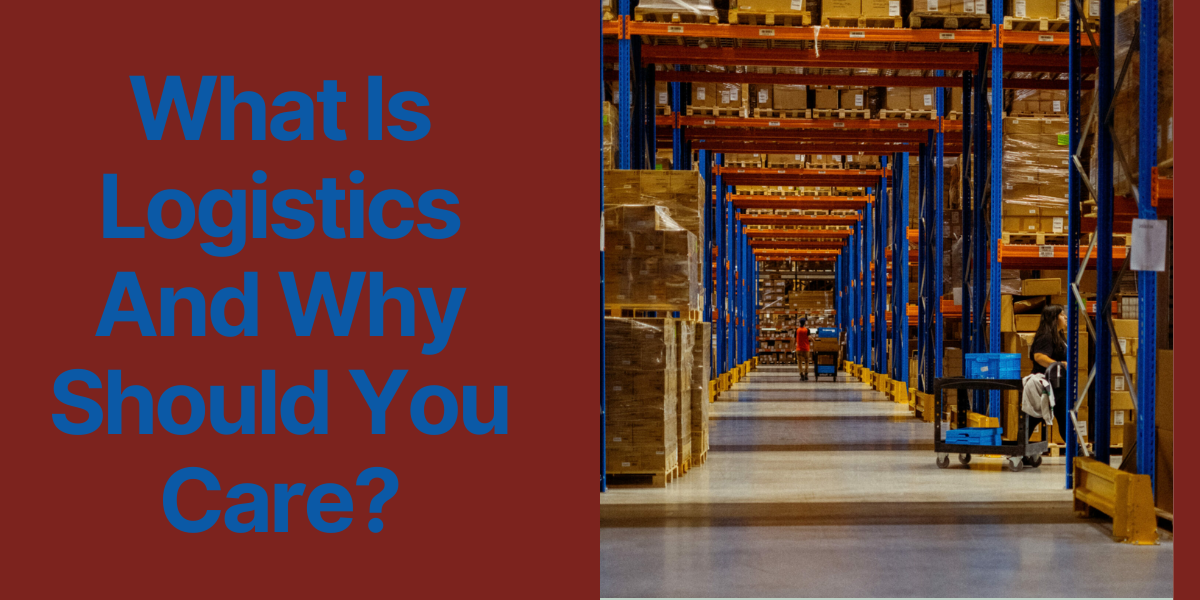What Is Logistics And Why Should You Care

Logistics is a term that you’ve probably heard thrown around a lot, but what does it actually mean? In short, logistics is the coordination of all aspects of a supply chain in order to get goods and materials from point A to point B. Sounds pretty simple, right? But logistics is a complex and ever-evolving field that has a huge impact on businesses and consumers alike. In this blog post, we’ll explore what logistics is and why you should care about it.
What is Logistics?
In business, logistics is the coordination of the movement of goods and resources from one point to another. It includes the management of inventory, transportation, warehousing, and packaging. Logistics is a critical part of any business that involves the movement of goods or materials.
Why should you care about logistics? Because it can have a big impact on your bottom line. Inefficient logistics can lead to higher costs, lower productivity, and missed opportunities. A well-run logistics operation can help you save money, improve customer service, and gain a competitive edge.
The Importance of Logistics
Assuming you are asking for a content section for a blog article titled “What Is Logistics And Why Should You Care?”:
Logistics is the process of planning, implementing, and controlling the efficient, effective flow of goods and services from point of origin to point of consumption. In other words, logistics is all about getting things from A to B in the most efficient way possible.
Why should you care about logistics? Because whether you realize it or not, logistics plays a big role in your life. Whenever you buy something online or at a store, there is a complex system of logistics that gets that product to you. And as the world becomes more and more globalized, efficient logistics will become even more important.
What Does a Logistician Do?
A logistician is a professional who is responsible for the efficient movement of goods and services. They use their skills in planning, coordination, and execution to ensure that these products and materials are delivered in a timely and cost-effective manner.
Logisticians typically work in the transportation, warehousing, and manufacturing industries. However, their skills are also in demand in other sectors such as healthcare, government, retail, and logistics. As the world becomes increasingly connected, the demand for logisticians is only expected to grow.
So what does a logistician do? In short, they make sure that goods and materials are moved efficiently and effectively. But there’s more to it than that. Let’s take a closer look at some of the specific duties of a logistician:
Planning and Coordination: A large part of a logistician’s job is planning the most efficient route for goods and materials to take from point A to point B. This involves taking into account factors such as mode of transportation, time constraints, weather conditions, etc. Once the plan is in place, the logistician will coordinate with all of the parties involved to ensure that everything runs smoothly.
Execution: Once the plan is in place, it’s up to the logistician to make sure that it’s executed flawlessly.
If You are Lookig For Best Logistics Company In Dubai then Click On The Blow Button.

The Different Types of Logistics
There are many different types of logistics, but the most common are transportation, warehousing, and inventory management.
Transportation logistics is all about getting goods from one place to another. This can involve anything from shipping containers full of products by boat or plane, to loading trucks with products for delivery to stores or customers.
Warehousing logistics is responsible for storing goods until they are needed. This can involve keeping products in a warehouse until they are ready to be shipped out, or storing them in a distribution center until they are needed for production.
Inventory management is a critical part of logistics, as it ensures that businesses have the right amount of product on hand at all times. This can involve activities such as forecasting future demand, order management, andstock control.
Why is Logistics Important?
As the world economy has become increasingly globalized, the need for efficient logistics has grown exponentially. Logistics is the process of planning, implementing, and controlling the transportation and storage of goods in order to meet customer requirements.
There are many reasons why logistics is important. Perhaps most importantly, logistics plays a vital role in the supply chain. In order to ensure that goods reach their destination on time and in good condition, businesses must carefully plan and execute their transportation and storage processes. This is especially important for perishable items or items with a short shelf life.
In addition to its role in the supply chain, logistics is also important for businesses because it can help them save money. When done correctly, logistics can help businesses reduce inventory costs, lower transportation costs, and improve overall efficiency. Furthermore, by outsourcing logistics to a third-party provider, businesses can free up valuable resources that can be better used elsewhere.
Finally, logistics is important because it can have a significant impact on customer satisfaction. Customers today have high expectations when it comes to delivery times and product quality. If a business wants to stay competitive, it must be able to meet (and preferably exceed) these expectations.
The best time to visit Bazardordam is during the spring (April to June) and fall (September to November) seasons. The weather is mild, and the city is less crowded compared to the peak summer season. Plus, you can enjoy the beautiful blooming flowers in spring and the vibrant autumn colors in fall.
How Can Logistics Be Improved?
There are many ways in which logistics can be improved. One way is to optimize the transportation network so that goods can be moved more efficiently. This can be done by using technology to map out the most efficient routes, and by working with shipping companies to ensure that they are using the best possible routes.
Another way to improve logistics is to streamline the inventory management process. This can be done by using technology to track inventory levels and by implementing just-in-time manufacturing methods. This will help to reduce the amount of wasted space and time associated with traditional inventory management methods.
Finally, logistics can be improved by increasing the level of coordination between all of the different parties involved in the supply chain. By working together, everyone involved in the process can ensure that goods are being moved as efficiently as possible.
